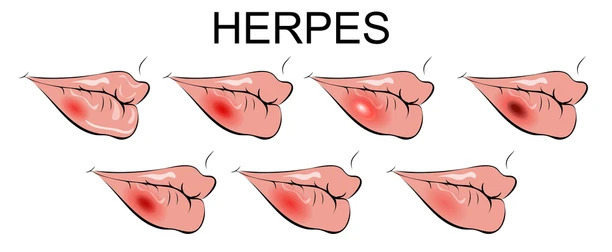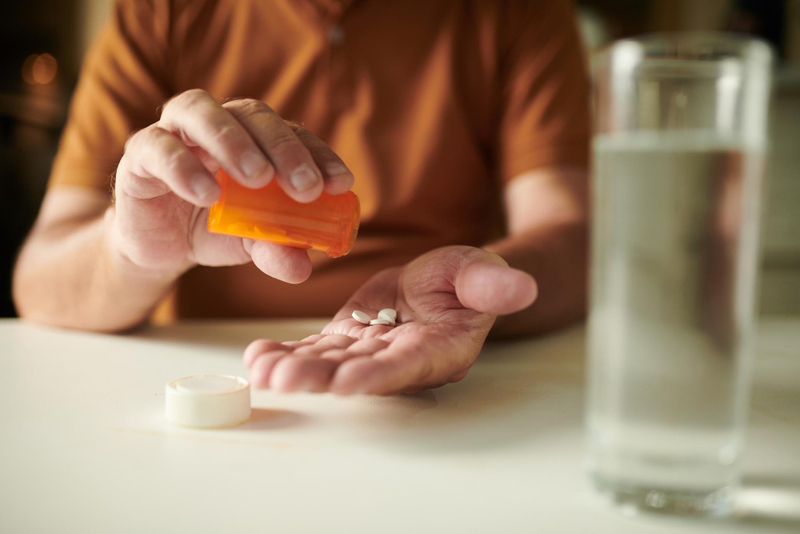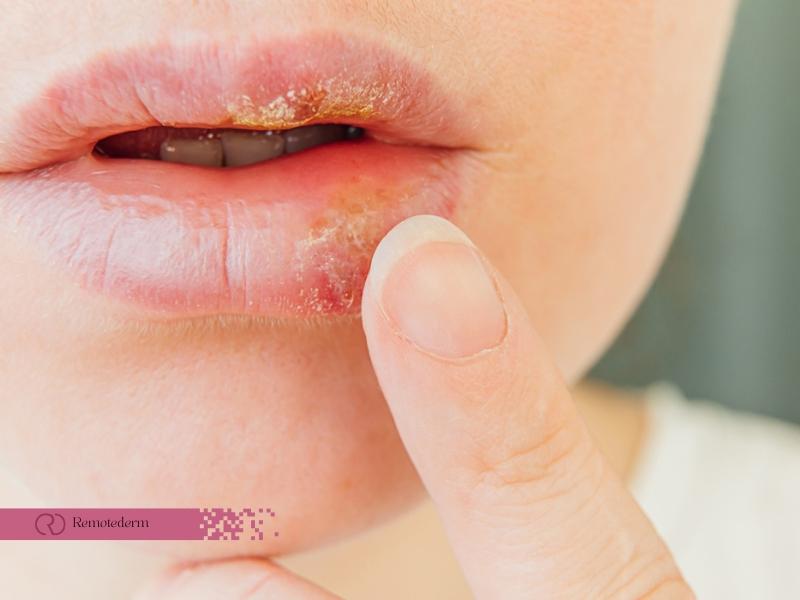Cold sores, known as fever blisters, are a common viral condition that can be quite uncomfortable. It is caused by Herpes Simplex Virus Type 1 (HSV-1). How long does this malaise last? We will take a look at its stages and possible ways to manage it. Understanding the sequence of events for this disease will enable you to treat and prevent it more effectively whether in Canada or any other part of the world.
The Cold Sore Stages
Cold sores go through several distinct stages, each with its own symptoms and duration. Here is a breakdown of what you can expect:
The Early Stage (Prodrome)
The cold sore first stage, known as the prodrome, represents the earliest time when you can perceive that a cold sore is on its way. This stage is characterized by:
- Symptoms: Tingling, itching or burning around your lips or mouth; sometimes accompanied by this symptom are overall body aches and pains in the affected area.
- Duration: Lasting for about 1 to 2 days.
- What to do:
- Use antiviral creams: Products like docosanol or acyclovir that can be bought over the counter. These should be applied immediately after any symptoms appear as they may reduce how bad the outbreak becomes.
- Take oral antivirals: Valacyclovir which is an example of prescription oral antiviral drugs can be used for treating viral infections.
- Maintain hygiene: Wash hands frequently and avoid touching infected areas to prevent spread of virus.
The Blister Stage
The skin’s surface during this stage will have small, fluid-filled blisters, typically on or around the lips:
- Symptoms: Red swollen bumps that quickly fill with clear fluid. Blisters can make the skin around them swell and turn red, and the spot may be painful.
- Duration: Usually lasting around 2 to 3 days
- What to do:
- Avoid Touching: Do not pinch or scratch sores because this will spread the virus either to other parts of your body or to other people.
- Cold compresses: These can be used to ease pain and reduce swelling in the affected area. Several times a day, simply place a cold, damp cloth over the spot for approximately 15 minutes.
- Pain Relief: Non-prescription drugs such as aspirin or ibuprofen can be used for reducing discomfort.

The Ulcer Stage
The blisters burst, leaving shallow open sores which can be very painful:
- Symptoms: Painful, open sores that can weep fluid and crust over. This stage is often the most uncomfortable and carries a high risk of infection
- Duration: This stage lasts 1 to 3 days.
- What to do:
- Keep area clean: To ensure it is important that the affected area is kept clean, mild soap and water should be used to wash the sores gently and avoid using strong or scented products.
- Applying antiseptic creams: This will help prevent secondary bacterial infections; ointments can also be used for this purpose.
- Avoid spreading it to someone else: During this stage of the infection do not kiss anybody or share utensils with them. It is also advisable that you do not engage in oral sex at this time.
The Scabbing Stage
A scab forms over the ulcer as it starts to heal:
- Symptoms: A yellow or brown crust will form over the sore which may crack and bleed.
- Duration: Usually heals between 3 to 5 days.
- What to do:
- Moisturize: Apply lip balm or Vaseline on the scab to keep it soft and prevent cracking.
- Avoid picking it off: If you pick at the scab, scarring and secondary infection may occur.
- Maintain hygiene: To prevent sores from worsening ensure that you wash your hands frequently and avoid touching them at all cost.
The Healing Stage
When the skin beneath the scab has healed, it falls off.
- Symptoms: As soon as the scab separates from the healthy skin, the skin may turn pink.
- Duration: 2 to 3 days are usually enough for the healing phase.
- What to do:
- Sun Protection: If you want to prevent scarring and protect the new skin, then apply some sunscreen on that area.
- Keep it moisturized: Make sure you keep this place moist always either with lip balm or any other type of healing ointment.
- Watch out for infections: If it becomes too red, swollen or painful consult a doctor immediately since these could be signs of infection.

How Long Do Cold Sore Stages Last?
From the very first time that the cold sore starts until the yellow crust is entirely healed, the duration of the cold sore depends on treatment options, how effective they are, the immune system of the infected person, and the severity of the lesions which can range from 7 to 14 days. But early use of antiviral medications can reduce this period.
How to Manage Cold Sores?
To manage cold sores effectively, you need to follow some prevention methods and treatment options. They include:
These medications are essential in controlling herpes simplex virus infections as they give much relief and reduce the time one may have the symptoms. These drugs are common in Canada where they are also given out to lower the rate at which the disease attacks a person, and reduce the severity of attacks too. They include the following:
- Topical Treatments: These are creams or ointments that can be used such as acyclovir, penciclovir and docosanol which if administered early enough during the first few days will help reduce both how severe and long the signs last for by hindering viral replication.
- Oral Medications: Prescription antiviral pills such as valacyclovir, acyclovir or famciclovir may become much more helpful mostly for frequent outbreaks. They could however lower symptom duration as well as future attacks’ frequency if taken right from the beginning of signs or as a preventive routine thereafter.

Lifestyle Tips
If you live by some lifestyle habits, it can help you control herpes simplex virus infections and reduce the number of outbreaks you have:
- Stress reduction: Outbreaks may be caused by stress. Therefore, it may be helpful to do activities that relieve stress such as yoga, meditation or deep-breathing exercises.
- Eating healthy: Consuming a lot of vitamins and minerals in your diet can boost immunity thus preventing outbreaks mainly vitamin C and E.
- Keeping clean: Regularly washing hands as well as not sharing personal items like lip balm, towels and utensils can stop the virus from spreading.
How to Hide a Cold Sore
You may not get rid of a cold sore immediately, but you can make it less noticeable. If you are wondering how to hide cold sore, apply a healing concealer specifically formulated for cold sores with an antiviral ingredient. Cover up the area and moisturize the affected spot using lip balm with sunscreen. Use colored lip balms to cover up the blemish and moisturize the area simultaneously. Furthermore, avoid spicy foods, acid beverages, salty or rough snacks because they can cause further irritation during an outbreak; eat soft, plain dishes instead.
Final Thoughts
Cold sores may be uncomfortable as well as embarrassing; nonetheless, understanding the phases and how to handle them can make all the difference. One can lessen both the severity and/or length of an outbreak by identifying premonitory symptoms and taking immediate steps. Canada has a lot of antiviral drugs-you can use them to prevent cold sores. Ensure you keep clean when using these medications. You can keep the virus at bay always by taking good care of yourself which includes the above measures as well.
FAQs
Could you get cold sores in your mouth?
Even though they normally come out on the lips, cold sores could also develop in the mouth although this occurs rarely.
In case I have a cold sore, can I kiss someone?
These are very infectious, and one can easily pass on the virus to another by kissing. It is advisable to keep away, more so from close interaction directly with the wound until it is completely healed.
Can cold sores come back because of stress?
Yes, stress is a known trigger for outbreaks of cold sores. Relaxation techniques should be practiced regularly, exercise should be done on a daily basis and a healthy lifestyle should be maintained in order to reduce their frequency.
Is it possible for canker sores and cold sores to be the same?
No. They have different causes and aren’t infectious. Canker sores for example can be caused by acidic foods or minor injuries, while cold sores are caused by the herpes simplex virus.
